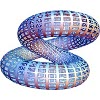Topology and Geometric Group Theory Seminar
The (compactly-supported) Euler characteristic can be thought of as a map $\chi$ taking (nice) topological spaces to integers, satisfying the additivity property that for any closed subset $Z$ of $X$, we have $\chi(X) = \chi(Z) + \chi(X \backslash Z)$. Classically, this can be defined by taking alternating sums of dimensions of compactly-supported rational cohomology groups. By taking the alternating sums of the groups themselves, rather than just
their dimensions, this can be thought of as taking values in $K_0(\mathbb{Q})$. When working with a closed manifold we have even more structure: Poincare duality. We can therefore think of the Euler characteristic as taking values in the \emph{Grothendieck--Witt group} of $\mathbb{Q}$; this is the group of $\mathbb{Q}$-vector spaces equipped with nondegenerate bilinear forms. In this talk we discuss how to lift the classical Euler characteristic to be $\pi_0$ of a map of spaces, and discuss the difficulties in doing so when attempting to lift the duality structure. Near the end we will explain why
$\infty$-categories can arise in such problems, and how working $\infty$-categorically can make such constructions feasible.
